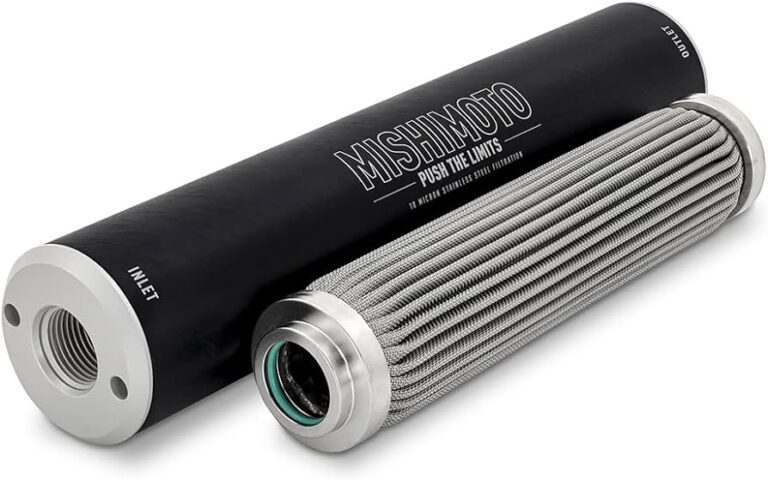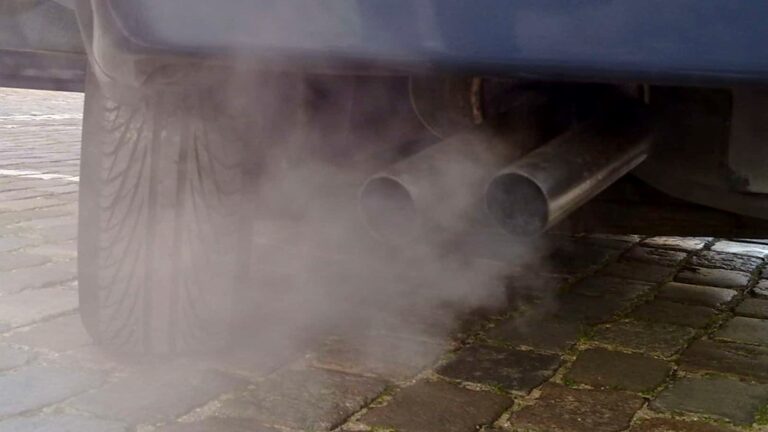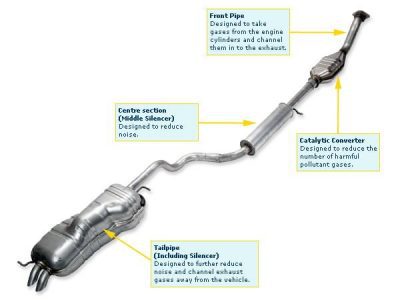Does Aftermarket Exhaust Improve Fuel Economy? Uncover the Truth!
Aftermarket exhaust does not improve fuel economy; in fact, it can potentially decrease it. Upgrading to an aftermarket exhaust system may provide benefits such as improved performance and a more aggressive sound, but it does not enhance fuel efficiency.
The Impact Of Aftermarket Exhaust Systems On Fuel Economy
The impact of aftermarket exhaust systems on fuel economy has been a subject of debate among car enthusiasts. Aftermarket exhaust systems are designed to improve vehicle performance, including increased horsepower and torque. However, their effect on fuel economy is not as straightforward.
Introduction to aftermarket exhaust systems:
- Aftermarket exhaust systems are aftermarket components that replace the stock exhaust system of a vehicle.
- These systems are usually made of higher-quality materials such as stainless steel or titanium.
- They often feature wider and smoother exhaust pipes, as well as less restrictive mufflers.
Role of exhaust systems in fuel economy:
- Exhaust systems play a crucial role in managing the flow of exhaust gases from the engine.
- By facilitating the removal of exhaust gases, they help reduce engine backpressure, which can improve fuel efficiency.
- However, aftermarket exhaust systems may alter the backpressure balance and affect the engine’s tuning, potentially leading to decreased fuel economy.
It is important to note that the impact of aftermarket exhaust systems on fuel economy can vary depending on various factors, including the specific vehicle, the type of exhaust system installed, and how the vehicle is driven.
How Aftermarket Exhaust Systems Affect Fuel Efficiency
How Aftermarket Exhaust Systems Affect Fuel Efficiency
When it comes to improving fuel economy, aftermarket exhaust systems play a crucial role. They have a direct impact on the overall performance of a vehicle, including its fuel efficiency. Various key factors influence how aftermarket exhaust upgrades can enhance fuel economy:
- Reduced exhaust backpressure: Aftermarket exhaust systems are designed to minimize backpressure, allowing the engine to breathe more freely. This reduction in backpressure leads to improved fuel combustion and engine efficiency.
- Increased airflow: Upgrading to a high-performance exhaust system enhances the airflow, enabling the engine to expel exhaust gases more efficiently. This optimization results in better fuel economy.
- Enhanced engine tuning: Aftermarket exhaust systems contribute to improved engine tuning, allowing for better control and timing of fuel injection. This fine-tuning maximizes fuel efficiency and power output simultaneously.
- Weight reduction: Some aftermarket exhaust systems use lighter materials like stainless steel or titanium, reducing the overall weight of the vehicle. This reduction in weight can positively impact fuel economy by improving the power-to-weight ratio.
In conclusion, incorporating aftermarket exhaust upgrades into a vehicle can significantly impact fuel efficiency by reducing backpressure, increasing airflow, enhancing engine tuning, and reducing weight. These improvements work together to provide drivers with better fuel economy and a more enjoyable driving experience.
Debunking Common Myths About Aftermarket Exhaust Systems
htmlAftermarket exhaust systems have long been the subject of debates regarding their impact on fuel economy. Let’s debunk some common myths:
| Myth 1: Aftermarket Exhaust Systems Increase Fuel Consumption |
| Contrary to popular belief, aftermarket exhaust systems do not necessarily increase fuel consumption. While it is true that some high-performance exhaust systems can result in a slight decrease in fuel economy, this depends on various factors such as the design and configuration of the system, driving habits, and vehicle characteristics. |
| Myth 2: Aftermarket Exhaust Systems Have Negligible Impact on Fuel Economy |
| While it is true that the impact of aftermarket exhaust systems on fuel economy might not be significant, it is incorrect to claim that it is negligible. Upgrading to an aftermarket exhaust system can potentially improve fuel efficiency by reducing backpressure and enhancing exhaust flow. However, the extent of this improvement may vary depending on the specific make and model of the vehicle. |
| Myth 3: Only Performance Enthusiasts Benefit from Aftermarket Exhaust Systems |
| Another common misconception is that only performance enthusiasts can benefit from aftermarket exhaust systems. While these systems do offer performance enhancements, such as increased horsepower and a better sound profile, they can also provide fuel efficiency benefits to everyday drivers. By optimizing the exhaust system, aftermarket options can potentially lead to improved fuel economy for both highway and city driving. |
Understanding The Science Behind Aftermarket Exhaust Systems
htmlAftermarket exhaust systems play a crucial role in enhancing not only the performance but also the fuel economy of a vehicle. By optimizing exhaust flow, these systems enable the engine to expel waste gases more efficiently, resulting in improved combustion and better overall efficiency.
How Aftermarket Exhaust Systems Enhance Exhaust Flow
The key element in aftermarket exhaust systems that enhances exhaust flow is the removal or replacement of the catalytic converters. While catalytic converters are necessary to reduce harmful emissions, they can also create backpressure, which restricts the exhaust flow. Aftermarket exhaust systems replace the stock catalytic converters with high-flow alternatives, such as high-flow catalytic converters or test pipes. These components minimize the flow restriction, allowing the exhaust gases to exit the engine more freely.
Catalytic Converters And Their Impact On Fuel Efficiency
| Catalytic Converters | Impact on Fuel Efficiency |
|---|---|
| Stock Catalytic Converters | Can create backpressure, reducing fuel efficiency. |
| Aftermarket High-flow Catalytic Converters/Test Pipes | Minimize flow restriction, improving fuel efficiency. |
By replacing the stock catalytic converters with aftermarket high-flow alternatives, vehicles can experience a reduction in backpressure, which in turn leads to improved fuel economy. The freer flow of exhaust gases allows the engine to operate more efficiently, resulting in better combustion and reduced fuel consumption.
Real-world Evidence: Studies On Aftermarket Exhaust Systems And Fuel Economy
Real-world Evidence: Studies on Aftermarket Exhaust Systems and Fuel Economy
Whether aftermarket exhaust systems can improve fuel economy in vehicles has been a subject of much debate. Several studies have sought to provide insight into this question. A comparative analysis between stock and aftermarket exhaust systems was conducted, with findings indicating potential fuel efficiency gains for vehicles equipped with aftermarket exhaust systems.
A separate study aimed to quantify the actual fuel efficiency gains obtained with aftermarket exhaust systems. Results indicated that these systems can indeed contribute to improved fuel economy, albeit to varying degrees depending on the specific vehicle and exhaust system combination.
Additionally, consumer feedback and experiences have shed light on the real-world impact of aftermarket exhaust systems on fuel economy. Many drivers report increased fuel efficiency and smoother performance, albeit with some variations depending on individual vehicle characteristics.
In conclusion, these studies provide real-world evidence supporting the potential for aftermarket exhaust systems to improve fuel economy. However, it is important to note that the extent of these gains may vary depending on multiple factors, including the vehicle model and type of aftermarket exhaust system used.

Credit: www.amazon.com
Factors To Consider Before Investing In An Aftermarket Exhaust System
Investing in an aftermarket exhaust system is a decision that should be made after considering a few key factors. Firstly, compatibility with your vehicle’s make and model is crucial. Not all aftermarket exhaust systems are designed to fit every car, so it is important to check if the system you are interested in is suitable for your specific vehicle.
Another factor to consider is the trade-off between performance and fuel economy. While aftermarket exhaust systems can enhance a car’s performance by increasing horsepower and torque, it’s essential to understand that this may come at the expense of fuel efficiency.
Moreover, legal regulations and emission standards should not be overlooked. Installing an aftermarket exhaust system that does not meet these requirements can result in penalties and legal issues.
Evaluating The Overall Benefits Of Aftermarket Exhaust Systems
Aftermarket exhaust systems can offer several benefits beyond just improving the sound and aesthetics of a vehicle. One of the key advantages is the potential for enhanced engine performance and power. The improved airflow provided by aftermarket exhausts allows the engine to operate more efficiently, resulting in increased horsepower and torque. This can lead to a more responsive and enjoyable driving experience.
Additionally, aftermarket exhaust systems can also contribute to potential savings in fuel costs. By optimizing the engine’s exhaust flow, these systems can help reduce back-pressure and improve fuel economy. With better fuel efficiency, drivers can potentially save money at the pump over time. It’s important to note that the extent of fuel savings will vary depending on factors such as driving habits and vehicle specifications.
In conclusion, aftermarket exhaust systems not only enhance sound and aesthetics but also offer the potential for improved engine performance, power, and fuel economy. Whether you’re looking for a way to enhance your vehicle’s performance or simply want to enjoy a more aggressive exhaust note, upgrading to an aftermarket exhaust system can be a worthwhile investment.
Best Practices For Selecting And Installing Aftermarket Exhaust Systems
When considering aftermarket exhaust systems for your vehicle, it is important to conduct thorough research to ensure you make the best choice. Researching Available Options and Brands: Start by exploring various options and brands available in the market. Look for exhaust systems that are specifically designed for your vehicle’s make and model. Compare customer reviews, ratings, and feedback to gain insights into the performance and quality of the product.
Consulting Experts and Professionals: Reach out to automotive experts or professionals who have extensive knowledge in aftermarket exhaust systems. Their expertise can provide valuable recommendations and guidance based on your vehicle’s specifications and performance goals. They can help identify which exhaust system would best suit your needs.
Proper Installation Techniques and Maintenance: Once you have selected the right aftermarket exhaust system, make sure to have it professionally installed. Proper installation is crucial for optimal performance and to avoid any issues. Additionally, ensure you follow the recommended maintenance tips provided by the manufacturer to prolong the lifespan of your exhaust system.
Frequently Asked Questions On Does Aftermarket Exhaust Improve Fuel Economy
What Exhaust Is Better For Gas Mileage?
A carefully selected exhaust system can improve gas mileage. Opt for a system that enhances engine efficiency and reduces back pressure.
Will A Bad Exhaust Affect Gas Mileage?
Yes, a bad exhaust can affect gas mileage. A malfunctioning exhaust system may cause reduced fuel efficiency due to restricted airflow and poor combustion. Regular maintenance is important to ensure optimal performance and fuel economy.
What Modifications Increase Mpg?
Modifications that increase mpg include regular maintenance, proper tire inflation, reducing vehicle weight, upgrading to high-efficiency tires, and using synthetic lubricants. Additionally, adopting efficient driving habits like avoiding sudden accelerations and maintaining a steady speed can also improve fuel economy.
Does Mileage Decrease With Exhaust?
Yes, mileage can decrease with an exhaust. The efficiency of the exhaust system affects fuel consumption, which can lead to reduced mileage.
Conclusion
Aftermarket exhaust systems can have a positive impact on fuel economy, depending on various factors such as the design and installation. By improving the flow of exhaust gases, these systems can reduce back pressure and increase engine efficiency. However, it is important to consider other factors that affect fuel economy, such as driving habits and vehicle maintenance.
Overall, while aftermarket exhaust systems may contribute to slight improvements in fuel economy, it is crucial to weigh the potential benefits against the cost of installation and any potential impact on emissions.






